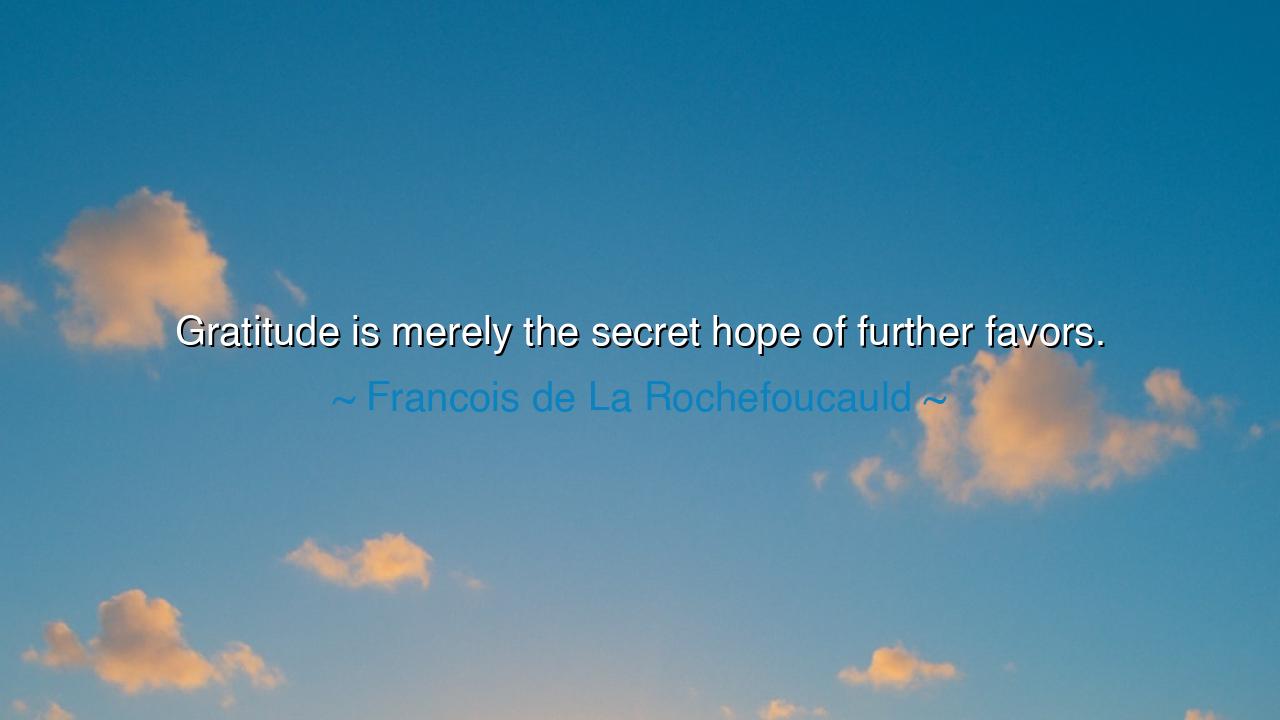
Gratitude is merely the secret hope of further favors.






Hear now, O seeker of truth, the piercing words of François de La Rochefoucauld, the French noble and philosopher of hearts, who said: “Gratitude is merely the secret hope of further favors.” In this sentence, spoken with the precision of a blade, he exposes a shadow that lies within the brightness of human virtue. His meaning is not to condemn gratitude, but to unmask its corruption — to remind us that even our noblest feelings may hide selfish roots. For La Rochefoucauld, who lived among the courtiers and flatterers of Louis XIV’s glittering court, no act of goodness escaped scrutiny; he saw in every bow, every smile, every word of thanks, the glimmer of personal gain. Thus he wrote not as a cynic without soul, but as a realist of the human condition.
Born amid the intrigues of the seventeenth century, La Rochefoucauld became one of the keenest observers of the human heart. His Maxims, from which this quote is drawn, stripped away the illusions of moral purity that society so proudly wore. In his world — a world of power, beauty, and betrayal — gratitude was rarely simple. Those who expressed it often sought not to honor kindness, but to secure it again. A man thanked his benefactor not only for what was given, but for what might yet be given. Gratitude, in this sense, was not pure virtue but a currency of influence — a polite mask for the hunger of advantage.
And yet, though his words sound cruel, they carry a deeper wisdom. La Rochefoucauld does not despise humanity; he simply reminds us that we are creatures of desire, ever reaching for more. When he calls gratitude “the secret hope of further favors,” he means that even our appreciation often springs from expectation. We say “thank you,” but deep within we whisper, perhaps again. This does not make us evil — it makes us human. The lesson, then, is not to despair at our nature, but to recognize it — to bring light to the hidden motives that govern our hearts.
Consider the tale of Marcus Licinius Crassus, the richest man of ancient Rome. When he lent money to friends and freed men from ruin, his acts seemed generous. Yet he did so not from love of mankind, but to bind others to him in obligation. His wealth grew not from commerce alone, but from the gratitude of those who owed him. He understood, as La Rochefoucauld did, that gratitude can become a chain as strong as iron, forged in the fires of expectation. But though Crassus gained power, he lost respect — for the heart knows when kindness is tainted by self-interest. His story teaches that gratitude without sincerity becomes merely a tool of ambition.
Still, we must not take La Rochefoucauld’s words as commandment, but as caution. If gratitude so easily becomes a mask for selfishness, then we must labor all the more to purify it. True gratitude — the kind that ennobles rather than ensnares — is born not of hope for reward, but of awe before the goodness of another. It is a sacred acknowledgment of life’s interdependence: that we are lifted not by our own strength alone, but by countless unseen hands. When gratitude is sincere, it humbles the soul, reminding it of its smallness and its need for others. When it is false, it exalts the ego and poisons both giver and receiver.
The ancients understood this delicate balance. The philosopher Seneca wrote, “He who receives a benefit with gratitude repays the first installment on his debt.” But he also warned that gratitude given with calculation is worse than ingratitude itself. For to pretend thankfulness while scheming for gain is to betray the very spirit of virtue. Thus, the wise cultivate awareness — they give thanks not for what they might yet receive, but for what already is. They learn to love the act of appreciation for its own sake, not for the promise it might carry.
So, my child of the turning world, let this teaching dwell within your heart: be wary of your motives when you say “thank you.” Ask yourself — is it gratitude that moves you, or desire disguised as courtesy? To be truly grateful is to find contentment in the gift itself, not in what may follow. Let your gratitude be as sunlight — warm, natural, and without expectation of return. Do not let it become a coin exchanged for future favor.
And remember, as La Rochefoucauld’s sharp wisdom still whispers through the centuries: human virtue is a garden forever in need of weeding. Selfishness grows like ivy upon the wall of even the finest heart. Only through awareness, humility, and sincerity can one keep it in check. Gratitude, purified of motive, becomes not a hope for favor — but a quiet prayer of acknowledgment to the mystery of goodness itself.






AAdministratorAdministrator
Welcome, honored guests. Please leave a comment, we will respond soon